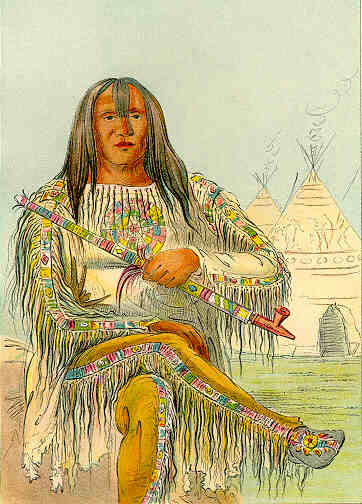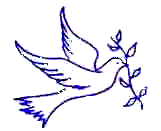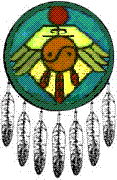|
The "Uncivilized" Native American
This was said by George Catlin about a People in the pre-"civilization" era prior to the mid to late 1800's -- I love a people that have always made me welcome to the very best that they had. I love a people who are honest without laws, who have no jails and no poorhouses. I love a people who keep the commandments without ever having read or heard them preached from the pulpit. I love a people who never swear or take the name of God in vain. I love a people "who love their neighbors as they love themselves." I love a people who worship God without a Bible, for I believe that God loves them also. I love a people whose religion is all the same, and who are free from religious animosities. I love a people who have never raised a hand against me, or stolen my property, when there was no law to punish either. I love and don't fear mankind where God has made and left them, for they are his children. I love the people who have never fought a battle with the white man, except on their own ground. I love a people who live and keep what is their own without lock and keys. I love a people who do the best they can. And oh how I love a people who don't live for the love of money. The artist George Catlin, who lived for eight years, 1831-1838, among 48 North American Plains Indian tribes, during the pre-"civilization" days. He wrote, in 1841, this short narrative to explain his reason and observations for writing the above creed. "All history goes to prove that when first visited by civilized people, the American Indians have been found friendly and hospitable ---- from the days of Christopher Columbus to the Lewis and Clark expedition ... And so also have a great many travelers, including myself: Nowhere to my knowledge, have they stolen a six-pence worth of my property, though in their country there are no laws to punish for theft. I have visited 48 different tribes, and feel authorized to say that the North American Indian in his native state is honest, hospitable, faithful, brave,... and an honorable and religious human being..."
-- Christopher Columbus, letter to Ferdinand and Isabella, 1493
John Lawson, who traveled extensively among the southeastern tribes in the early eighteenth century, also dwelled on the integrity of native culture and took note of many traits, such as cleanliness, equable temperament, bravery, tribal loyalty, hospitality, and concern for the welfare of the group rather than the individual, that often seemed absent from English society. Like Catlin, Lawson concluded that the Indians of the southern regions were the "freest people from Heats and Passions (which possess the Europeans)." He lamented that contact with the settlers had vitiated what was best in Indian culture. Many other writers who did not covet the Indians' land or were not engaged in the exploitive Indian trade, agreed that the concept of community, which colonial leaders cherished as an ideal but rarely achieved, was best reflected in North America by the natives. As Pearce has noted, "the essential integrity of savage life, for good and bad, became increasingly the main concern of eighteenth-century Americans writing on the Indian." -- Gary B. Nash, Red, White, and Black: The Origins of Racism in Colonial America In most pre-Columbus American cultures, the political structure resembled a democratic society. In contrast, Christian Europe was a feudal system with an economic class, controlled by the tyrannic church.... -- Dave Fisher, "Violent Christian Europe vs. the Americas" I am convinced that those societies (as the Indians) which live without government enjoy in their general mass an infinitely greater degree of happiness than those who live under European governments. Among the former, public opinion is in the place of law, and restrains morals as powerfully as laws ever did anywhere. Among the latter, [European and Colonial] under pretence of governing, they have divided their nations into two classes, wolves and sheep. -- Thomas Jefferson to Edward Carrington, January 16, 1787 It is necessary that we should not lose sight of an important truth which continually receives new confirmations, namely, that the provisions heretofore made with a view to the protection of the Indians from the violences of the lawless part of our frontier inhabitants are insufficient. It is demonstrated that these violences can now be perpetrated with impunity, and it can need no argument to prove that unless the murdering of Indians can be restrained by bringing the murderers to condign punishment, all the exertions of the Government to prevent destructive retaliations by the Indians will prove fruitless and all our present agreeable prospects illusory. The frequent destruction of innocent women and children, who are chiefly the victims of retaliation, must continue to shock humanity, and an enormous expense to drain the Treasury of the Union. -- George Washington, Seventh Annual Address, December 8, 1795 Does this sound like the situation with the native peoples around the world today in 2002?? That they will retaliate for the injustices done them? In Agrarian Justice, Thomas Paine returned once again to the Iroquois, among whom he had learned democracy, when he wrote, "The fact is, that the condition of millions, in every country in Europe, is far worse than if they had been born before civilization began, or had been born among the Indians of North-America at the present day." James Axtell analyzed documents of Europeans who fled the tyrannic "Christian" life and lived with the Indians. He concluded that "whites chose to remain part of the Indian culture" because they had: A strong sense of community However, the Christian leaders didn't like the idea that some of their people would favor a "heathen" life like this. One without the hatred, racism, and malice towards others, even towards those within the same community. Therefore, laws were made to control people with fear if they chose to live a life filled with love. The penalty was, of course, severe for those who sought to leave the evils of Christian settlements. They were hunted down, caught, and faced many different forms of punishment, depending on how religious the Christians felt. They could be flogged, shot, or burned alive. -- "The Christian Invasion of North America by the English" Thus Were We Created Our Creator put us on this wide, rich land, and told us we were free to go where the game was, where the soil was good for planting. That was our state of true happiness. We did not have to beg for anything. Our Creator had taught us how to find and make everything we needed, from trees and plants and animals and stone. We lived in bark, and we wore only the skins of animals. Our Creator taught us how to use fire, in living, and in sacred ceremonies. He taught us how to heal with barks and roots, and how to make sweet foods with berries and fruits, with papaws and the water of the maple tree. Our Creator gave us tobacco, and said, Send your prayers up to me on its fragrant smoke. Our Creator taught us how to enjoy loving our mates, and gave us laws to live by, so that we would not bother each other, but help each other. Our Creator sang to us in the wind and the running water, in the bird songs, in children's laughter, and taught us music. And we listened, and our stomachs were never dirty and never troubled us. Thus were we created. Thus we lived for a long time, proud and happy. We had never eaten pig meat, nor tasted the poison called whiskey, nor worn wool from sheep, nor struck fire or dug earth with steel, nor cooked in iron, nor hunted and fought with loud guns, nor ever had diseases which soured our blood or rotted our organs. We were pure, so we were strong and happy. But, beyond the Great Sunrise Water, there lived a people who had iron, and those dirty and unnatural things, who seethed with diseases, who fought to death over the names of their gods! They had so crowded and befouled their own island that they fled from it, because excrement and carrion were up to their knees. They came to our island. Our Singers had warned us that a pale people would come across the Great Water and try to destroy us, but we forgot. We did not know they were evil, so we welcomed them and fed them. We taught them much of what Our Grandmother had taught us, how to hunt, grow corn and tobacco, find good things in the forest. They saw how much room we had, and wanted it. They brought iron and pigs and wool and rum and disease. They came farther and drove us over the mountains. Then when they had filled up and dirtied our old lands by the sea, they looked over the mountains and saw this Middle Ground, and we are old enough to remember when they started rushing into it. We remember our villages on fire every year and the crops slashed every fall and the children hungry every winter. All this you know. -- Tenskwatawa (Shawnee), message to his people, c. 1805 In 1832 George Catlin, the painter, went West and spent eight years with the unchanged Indians of the Plains. He lived with them and became conversant with their lives. He has left one of the fullest and best records we have of the Redman. From his books this quote concerning the Indian's religion: The North American Indian is everywhere, in his native state, a highly moral and religious being, endowed by his Maker with an intuitive knowledge of some great Author of his being, and the Universe, in dread of whose displeasure he constantly lives, with the apprehension before him of a future state, where he expects to be rewarded or punished according to the merits he has gained or forfeited in this world. We have been guilty of only one sin - we have had possessions that the white man coveted. -- Eagle Wing (Sioux), Ploughed Under, the Story of an Indian Chief Told by Himself, 1881 We are all poor because we are all honest. -- Red Dog (Oglala Sioux), quoted in Native American Wisdom, late 19th century Love and adore the Good Spirit who made us all; who supplies our hunting-grounds, and keeps us alive. -- Tshut-che-nau, Chief of the Kansas It is a commentary on our boasted "Christian" civilization that although there were two or three salaried missionaries at the agency [during the Wounded Knee Massacre] not one went out to say a prayer over the poor mangled bodies of these victims of war. -- James Mooney, "The Ghost-Dance Religion and the Sioux Outbreak of 1890," 1896 Dr. Charles A. Eastman, born Ohiyesa (Santee Sioux), Chapter 4: Barbarism and the Moral Code, The Soul of the Indian: An Interpretation, 1911 One great difference in our ways is that, like the early Christians, the Indian was a socialist. The tribe claimed the ground, the rivers and the game; only personal property was owned by the individual, and even that, it was considered a shame to greatly increase. For they held that greed grew into crime, and much property made men forget the poor. Our answer to this is that without great property, that is, power in the hands of one man, most of the great business enterprises of the world could not have been; especially enterprises that required the prompt action impossible in a national commission. All great steps in national progress have been through some one man, to whom the light came, and to whom our system gave the power to realize his idea. The Indian's answer is, that all good things would have been established by the nation as it needed them; anything coming sooner comes too soon. The price of a very rich man is many poor ones, and peace of mind is worth more than railways and skyscrapers. In the Indian life there was no great wealth, so also poverty and starvation were unknown, excepting under the blight of national disaster, against which no system can insure. Without a thought of shame or mendicancy, the young, helpless and aged all were cared for by the nation that, in the days of their strength, they were taught and eager to serve. And how did it work out? Thus: Avarice, said to be the root of all evil, and the dominant characteristic of the [European] races, was unknown among Indians, indeed it was made impossible by the system they had developed. Ernest Thompson Seton, Chapter II: The Spartans of the West, The Book of Woodcraft, 1912 on the duplicity and of the white man They spoke very loudly when they said their laws were made for everybody; but we soon learned that although they expected us to keep them, they thought nothing of breaking them themselves. Their Wise Ones said we might have their religion, but when we tried to understand it we found that there were too many kinds of religion among white men for us to understand, and that scarcely any two white men agreed which was the right one to learn. This bothered us a good deal until we saw that the white man did not take his religion any more seriously than he did his laws, and that he kept both of them just behind him, like Helpers, to use when they might do him good in his dealings with strangers .... We have never been able to understand the white man, who fools nobody but himself. -- Plenty Coups, Chief of the Crows, published 1962 For a long time Native Americans have been rebuking textbook authors for reserving the adjective "civilized" for European cultures. In 1927 an organization of Native leaders called the Grand Council Fire of American Indians criticized textbooks as "unjust to the life of our people." They went on to ask, "What is civilization? Its marks are a noble religion and philosophy, original arts, stirring music, rich story and legend. We had these. Then we were not savages, but a civilized race." Even an appreciative treatment of Native cultures reinforces ethnocentrism so long as it does not challenge the primitive-to-civilized continuum. This continuum inevitably conflates the meaning of civilized in everyday conversation - "refined or enlightened" - with "having a complex division of labor," the only definition that anthropologists defend. When we consider the continuum carefully, it immediately becomes problematic. Was the Third Reich civilized, for instance? Most anthropologists would answer yes. In what ways do we prefer the civilized Third Reich to the more primitive Arawak nation that Columbus encountered? If we refuse to label the Third Reich civilized, are we not using the term to imply a certain comity? If so, we must consider the Arawaks civilized, and we must also consider Columbus and his Spaniards primitive if not savage. Ironically, societies characterized by a complex division of labor are often marked by inequality and capable of supporting large specialized armies. Precisely these "civilized" societies are likely to resort to savage violence in their attempts to conquer "primitive" societies. -- James W. Loewen, Lies My Teacher Told Me "Why Have Our Teachers Lied To Us?" The Answer --
They are vassals of the Law and Live in Fear.
Laws are made to control people with fear
These are things that I know ----- Remember, If the Creator put it there, it is in the right place. The soul would have no rainbow if the eyes had no tears. I know that All must be brought into the Sacred Hoop for it to be mended. I often wonder how we will bring those who do not see even the simplest of Circles into the greatest Circle of all. Then I remember it is a thing that has been promised by Spirit.
Ho mitakuye oyasin, Hetch etu aloh..!!
Reproduction of all or any parts of the above text may be used for general information. Mirroring is not Netiquette without the Express Permission of Barefoot.
Created Feb 20, 2002 Three mighty important things, Pardn'r, LOVE And PEACE and HONEST EDUCATION |



